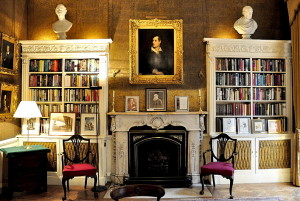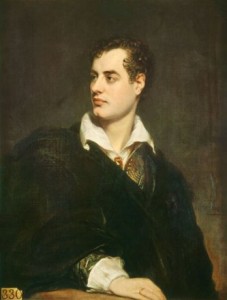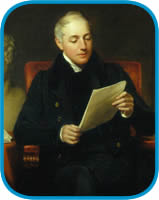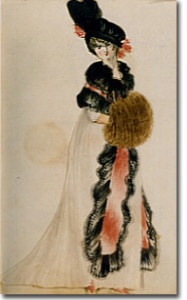As my first post for the new Austen Variations blog, I thought I’d share an excerpt from the climactic scene in my short play about an imagined meeting between Jane Austen and Lord Byron. This historic meeting (I suppose I must make the disclaimer) never actually took place, but I have set the scene at the moment in the two authors’ lives when it was closest to being possible. It is the winter of 1815/16, a time when Jane Austen and Lord Byron are both in London. She is enjoying her first taste of publishing success (which sadly will be the last in her lifetime), and he has not yet departed for the Continent forever. Imagine now that we are in the offices of their mutual publisher James Murray. The two writers have been brought together by a stratagem between her brother and the publisher. After mutual compliments, they begin to discuss their work…
A BROTHER’S STRATAGEM: JANE AUSTEN MEETS LORD BYRON
Excerpt from Scene Three – Jane and Byron
BYRON
Miss Austen, I am afraid that I do not like the moralizing strain you are fallen into, in Mansfield Park.
JANE
Is that so? You are not the only man not to admire my heroine. She is not as charming as my Elizabeth.
BYRON
I should say not! Never was there a more dismayingly virtuous woman. Stubborn, dull, preachifying – oh! I do beg your pardon, Miss Austen.
JANE
I am not affronted. Pray continue.
BYRON
It is only a reflection of how very real your characters are. They become as much friends as one’s own friends, somehow. I don’t know how you do it, I wish I had that particular gift.
JANE
And I wish I had your wonderful suppleness of tongue, Lord Byron. As one of my characters in my new novel, Emma, says, “What a perfect character you and I should make, if we could be shaken together. My liveliness and your solidity would produce perfection.” Only in our case, I believe, it would be your liveliness.
BYRON
Ah, no, you are perfection already. Only you have overdone it with your Miss Fanny. How I hate prudes! I am glad your enchanting Mary Crawford ends up with her own brother, and you have left Fanny and her dull Edmund to bore each other to death.
JANE
Mary – ends up with Mr. Crawford, you say? But, they are brother and sister.
BYRON
I thought that was a masterpiece of subtlety Miss Austen; as to be sure you could not say it straight out. You know very well – I know you do – that it is possible to love a brother or sister as a man loves a woman. Do you not say, yourself, “A strengthener of love, in which even the conjugal tie is beneath the fraternal.” And, “Fraternal love, sometimes almost everything, is at others worse than nothing.” You see I have committed these wondrous sentences to my heart and mind.
JANE
Yes, but you cannot think I meant –
BYRON
How often have I read those precious passages, and in a book I disliked, too! Yes, yes, Miss Austen, I know you understand the human heart in all its varieties. You understand Henry Crawford – how like he is to me! How he reads Shakespeare! What an actor Crawford is! And he can find no other woman to equal his sister. It is nonsense to believe that he could ever be truly in love with a Fanny Price!
JANE (bewildered)
Good Heaven. What are you saying?
BYRON
I am saying that as you are the most intelligent woman in the country, perhaps the universe, you and you alone can understand my heart. You have portrayed me in a thousand guises before you even met me. Willoughby! Crawford! You may be a virgin, but you understand men. How is that? You have had no experience, you have not lived. But yet, you know!
JANE
Lord Byron, you forget yourself. This is not a right sort of discussion. I think I must beg to withdraw at once.
BYRON
No, no, don’t go. Only a few more moments. You are a witch, there is nothing you do not know. Your Fanny, as much as I hate her, is the most living character you ever drew!
JANE
What do you mean? Am I to suppose that you have ever known a girl like my Fanny Price? I should find that hard to believe, in the circles in which it is said you move.
BYRON
Of course I have, damn it. Oh, excuse me, Miss Austen, for my language and general behavior, but I am undone. You must forgive me; it is absurd for there to be any reticences between two such minds as ours.
JANE
I hope you do not expect me to imitate your openness.
BYRON
Fanny Price is my wife, Miss Austen. Lady Byron is Fanny Price made flesh. You have painted her to the life, and it is no wonder that Mansfield Park is her favorite of your books. And to think, I gave it to her myself!
JANE
Did you? I am glad that she enjoyed it, if you did not.
BYRON
It was too close to home for me. Miss Austen, I will tell you what I have never spoken aloud to any human soul – only your mind, that of the greatest student of human nature that has ever been known – you, alone, will understand, my love, and my sin. I have made love to my sister. We love each other.
JANE
Lord Byron! You must not tell me such things, even if they are true, and I am very sure they are not. You are only intoxicated, and will be bitterly sorry for your language tomorrow.
BYRON
Intoxicated! I wish I were. If only it were as easy as that. Miss Austen, my wife and my sister are at each other’s throats about me as it is – my wife threatens scandal and ruin – I shall be forced to divorce her, and to leave England, entirely and for ever!
JANE
What fantastical ideas, Lord Byron!
BYRON
Every word is true, I swear it. And now, Miss Austen, tell me – what is your opinion of me? Do you think I may be redeemed, or am I damned for all eternity? For I am a superstitious fool, as all men of great imagination are. Half the time I think there can be no evil in any love between a man and a woman, and the rest of the time I believe I will burn for what I have done.
JANE
These are things which you must talk over with a clergyman. I am not competent.
BYRON
Better you than any clergyman! You are the only woman in England who can help me, or else I must go to the devil. You don’t think I’d seek solace in some great cold clever worldly mind alone, do you? But you – as clever and clear-eyed a genius of the human heart and its foibles as ever existed – yet withal, a kind woman, and religious – sane, and good as you are: You, and you only, can help me.
JANE
Lord Byron, no! Prayer and prayer alone can help you. I will pray for you. But if I may advise –
BYRON
Yes?
JANE
Do your work, and find your happiness in that, not in sin.
BYRON
Spoken like a spinster without a stain on her character. But I do have something in hand, in the way of work. A long poem, a life work…a portrait of our time, I intend it to be. When my present troubles are over, I shall commence it.
JANE
I believe you will be glad for that, it is your right course. And surely – things will improve, with your wife. Did not I hear from Mr. Murray, that you have only just become a father?
BYRON (wearily)
Yes, my daughter was born just a few days ago.
JANE
Well! That explains…My brothers are always quite distrait at such times. I shall think no more of what you have said. It means nothing of course.
(Silence)
BYRON (bowing ironically)
If it must be that way.
JANE
I think it had better be.
– FINIS –
From the author: Comments and speculation welcome! Would you imagine a meeting between Austen and Byron differently? Do you think he would say the things he does to her, and would she stay and listen? Is he too outrageous, she too prim? I know I will have offended Byronists, as there is no evidence that Byron ever behaved as he said he does here; but my aim was to be, as Jane Austen had Elizabeth call Darcy, a “teasing, teasing [wo]man.” For the sake of Lord Byron’s reputation, I state: this is fiction! What would you have had them talk about, had they met?





45 comments
Skip to comment form
Lol, oh Byron 😉
The more outrageous he gets, the more prim she becomes – perfect!
Author
snicker, and thanks!
I wouldn’t imagine that Jane will stay in the same room as Lord Byron and listen to his nonsense. I think they would talk about her characters and plots from her novels, his literary pursuits and poetry and works written by their contemporaries.
Byron actually liked sensible women, it’s just that they were hard to find in the regular London circles. Did you mention the part where he invited her to dinner w/ de Stael and she turned him down? I imagine they would have found something they could detest together, the Regent was always handy for that sort of thing.
Author
Yes, de Stael is elsewhere in the play, Mathilda! I’m sure they could have talked about a great many other things (including the Prince Regent) – if only they really had met. But…
Author
Luthien, I’m sure you are right, really! But Byron just has so much personality there’s no controlling him…
I would have pictured Jane not as prim but more forceful in her opinion. ( politely put of course )
As for Byron, to me, he was spot on. I always pictured him as being forthright in speech but always in a genteel way.
Will you have this work offered in a performance play or just for reading pleasure?
Definitely interesting reading! Thanks for sharing
Author
Thank you, Carol! I think the stuff he was saying made her clam up a bit. Well, I’ve had a few of my plays performed or read, with another coming up in the fall, but nobody’s asked for the Byron one. Maybe now they will. 🙂
I’ve never thought that a meeting between the two can be possible! :0
Thanks for sharing it!
Author
Loren, it could have happened – they had the same publisher, a doctor in common, Henry Austen mingled with people who knew Byron, and they were even known to have been at the same art exhibit. So if it didn’t happen, it SHOULD have! At least I think so. 🙂
this is delightful and precious.
Author
Thank you so much, Anne. You make my day!
I’ve actually read two other authors put Byron and Austen in the same story. Both portrayed Jane as intrepid enough to hear out anything Byron would say and him possessing something more than the flamboyant man he gave the public eye.
Austen was an observer of people and their behaviors so I could definitely see her as absolutely fascinated by Byron. Just as Byron had the capacity to see that people wear facades and he would know after reading her books not to dismiss Austen out of hand. I could see him saying outrageous things just to provoke her into letting her true self out to play.
Enjoyed your play excerpt, Diana!
Author
Thank you, Sophia. Even if it didn’t happen, like you, I really think they would have been fascinated by each other. That’s why I couldn’t resist. I would be very grateful if you can remember titles of any stories you read about them both. I’d like to read them!
Here are the names of those books. Jane and the Madness of Lord Byron by Stephanie Barron (mystery). Jane Austen Bites Back by Michael Ford (Paranormal Modern trilogy) In the second book, they are a bit more than just acquainted and neither are human just to give fair warning. 😉
Diana, your Byron is spot on in his inability to hear what he does not wish to hear! And his wife as Fanny Price! Perfection. As for Jane Austen – I find it hard to think of her as prim. She may say all the proper things in the appropriate situation, but from her letters, I suspect she was difficult to shock. I wish we could see her thoughts as well in your play!
I wish I could be there for the performance. I hope you’ll have it videotaped.
Author
Thank you, Abigail! I don’t see her as prim either, but I think she’d have handled this situation the way she did. How she talked or wrote of it within her family would be another story!
I hope somebody will perform or read my Byron play sometime – that would be very cool!
If such a meeting had taken place, I would have loved to be a fly on the wall to hear it. Thanks for sharing!
Author
That is exactly how I felt, Susan, and why I wrote it! Thanks for commenting.
Diana, I truly enjoyed your snippet. I’d love to read the entire play when it’s finished, or better yet, see it performed. The idea of Mary and Henry Crawford doing the deed is something that has never, ever entered my mind. I don’t think I’ll read Mansfield Park in quite the same way anymore! But you may have something there. I think you’ve channeled into Byron quite well. Seems totally plausible. Thank you for something to think about.
Author
Thank you so much for your comments, Sheila. Never meant to ruin Mansfield Park for anybody. 🙂 I do hope I can get the play read somewhere, there’s nothing more fun than having that happen!
Just one word: INGENIOUS! 🙂
Author
Thank you so much, Denisia! 🙂
Diana,
This was a pure treat to read! Loved the humor, Byron’s outrageous behavior, Austen’s reaction and the beautiful setting. I can only guess at what Jane might be thinking during such a conversation, but I’d bet that while she would very well have behaved so properly in public, she was taking pages of mental notes to share with her sister Cassandra and plotting out the descriptions of future characters based on what she witnessed in Byron’s actions, LOL.
🙂
Author
Thank you very much, Marilyn! I think that what Jane Austen would have been thinking durnig (or after) such an encounter, would make a whole nother play!
Jane Austen as a witch! Love it! I love the idea that Byron doesn’t dismiss her as Charlotte Bronte does. He clearly appreciates her qualities, and that makes him come across as astute, too. An enjoyable read, Diana. Good luck with the rest of it.
Author
Thank you, Monica. I can’t believe Byron wouldn’t have appreciated her. I enjoyed calling her a witch though, it’s so absurd!
I am glad he acknowledges her as an accomplished author. I believe she would’ve wanted to study him, but eventually would turn it towards their writing.
Author
Deborah – Yes, and she might have, if she’d only lived longer!
Oh my! Quite the pair.
Author
Aren’t they, though?! Thanks for commenting, Becky.
Ah when real life enters into one’s imagination. That’s some dialogue!
Author
Thank you for commenting, Chanpreet. This was really the most fun to write!
I do not think Jane could be shaken. Scandal is throughout her books so she was no stranger to what people are capable of. I think she would find Byron amusing and interesting.
Author
Schilds, I totally agree with you. I believe she would have behaved in a polite, ladylike way, but she would have been intensely interested!
Very interesting! I don’t know that much about Byron, but have heard about his rumored private life. I’m guessing he enjoyed his notoriety and in your dialog, I find him trying to be flamboyant as possible, as if to see how shocking he can be. But they talk so much about Mansfield Park that clearly he’s indicating that he’s read and really thought about her book which I would think Jane Austen as a fellow author must appreciate. Until he seemed to veer off into alluding to his personal demons.
I also believe that day to day life wasn’t always as proper as portrayed in books of the time (or lived so closely by society’s rules) so I doubt Jane would have been truly shocked by whatever Byron could say to her. (But that doesn’t mean she wouldn’t have been thinking “Ewwww!” while talking to him and I felt she did a good job bringing his ramblings on that topic to a close.) Had they actually met, maybe she would have found some way to introduce a real reprobate into a future story with some Byron-like tendencies?
Author
Interesting comments, Kathy. Even though she would be unlikely to discuss improprieties with Byron, how could she help finding him interesting? She used some pretty hardened and even Byronic reprobates in her stories, such as Willoughby and Wickham, but imagine how much farther she could have taken them if she’d known Byron! Or would she? She made heroes out of Edward and Edmund, after all. I leave it to yourself to determine!
Thanks so much for sharing this scene. I read the previous scene you had posted and was so curious what the meeting would be like. I can’t say that I imagined this! I read it while waiting in line for morning coffee and had to stop myself from laughing out loud because people were starting to look at me funny.
Author
I wish you could see me, TLeighF, grinning ear to ear! I was worried that it wasn’t funny enough! Really I have concluded, at an advanced age, that Jane Austen knew what she was talking about when she had Mr. Bennet say, “For what do we live, but to make sport for our neighbors, and laugh at them in our turn.” Often quoted, and seems trivial, but as so much in Jane Austen…profound! Thanks so much for telling me about that laugh.
🙂
Amazingly outrageous and absolutely wonderful! But… poor Fanny Price! 🙂
Author
Thank you dear Vera! But don’t waste energy worrying about Fanny? Pfft!
Jane Recoils
Jane Austen said, Look here, Mister.
I won’t hear such talk of your sister.
You’re joking, I’m sure.
But I do you adjure
Not to say such things as you’ve kissed her,
Or used her in even worse fashion.
What a horror would be such a passion!
The thought turns my face quite to ashen.
Because I’m a sharp raconteur,
It appears, My Lord, you infer
That I have, like you,
A debauched world view.
But from this idea I demur.
I am not like those of your set;
I don’t drink to excess, nor bet,
Nor quiz people through a lorgnette.
Though I love to laugh at the high-flown,
There are limits to what I condone.
Whene’er I lambaste,
I still use good taste.
The crass, in me, is unknown.
And so, Dear Sir, my wish is
That you save your louche tales for the vicious,
As I find them far from delicious.
I like the rhymes in your poem—very clever!
Oh, I love it, Diana ~ Byron and Jane together ~ delightful. Thank you so much. ~ Cheers ~ Elizabeth MacGregor-Kirkcaldy.